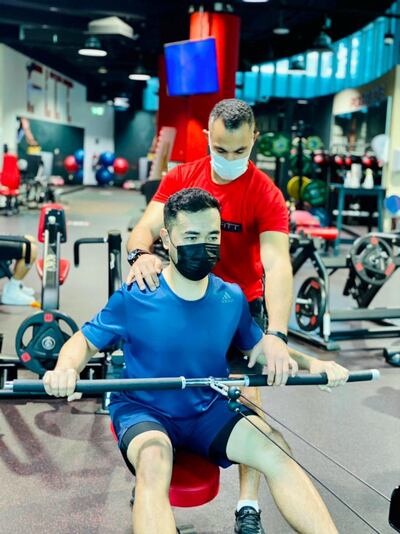Although logic would dictate that fasting could actually help one shed pounds, more often, the opposite tends to happen. As the holy month begins, long periods without food and water, coupled with summer heat, can have an adverse effect on weight loss goals.
Zeina Maktabi, a holistic nutritionist and functional medicine practitioner, believes this happens because people think that fasting all day will give them a "free pass to indulge beyond their means".
“People rush to eat fast, are not mindful of whether they are full, don’t chew properly, put more on their plate and don’t listen to their stomach tell them it’s full,” she says.
Lina Shibib, a clinical nutritionist at Medcare Hospitals and Clinics, agrees, adding that "the reduced water intake plays a significant role. When your body is dehydrated, there is a loss of energy. To replenish that energy, people tend to eat more."

All in all, gaining weight during Ramadan is avoidable, as experts point out, fasting is actually one of the best strategies for weight loss.
If you're thinking of using this time to get fitter and and healthier, here's how you can do it.
Set a realistic goal
Most experts recommend starting a fitness routine with a clear outcome in mind.
“The best fitness goals for Ramadan are getting a leaner body and maintaining muscle mass,” says Mohammed Allam, a personal trainer with Metrofitt.
When it comes to losing weight, ensure the goal is realistic. "According to the Centres for Disease Control and Prevention (CDC), that's one kilogram per week," says Shibib. "That means, on average, aiming for 4kg of weight loss per month is healthy."
To increase your chances of healthy weight loss, it’s important to incorporate a mix of diet and exercise.
Weight loss through diet and nutrition:
Ensure you’re hydrated
Drinking water can help you eat less, and lose weight, especially if you have it before a meal, says Shibib. Bored of drinking plain water? Maktabi recommends experimenting with herbal teas, infused water and unsweetened coconut water after sunset.
Iftar: what to eat and in what order
Maktabi recommends always breaking a fast with soup.
“It’s a great way to hydrate the body and prepare the stomach for food. Limit creamy soups and focus on ones with clear broth, that are rich in minerals, with added vegetables or legumes. The classic lentil soup is a great example.”
"Next make sure more than half your iftar plate is made up of vegetables. Non-starchy vegetables help provide fibre and satiate you. Make sure you are getting enough protein as this maintains muscle mass," she says. Swap out red meat with skinless chicken or fish.
Finally carbs must be eaten last: “Try wholegrain options and slow carbs like sweet potato and quinoa.”
Suhoor: don’t skip it
It might be tempting to skip this meal for those extra few hours of sleep, but doing so will only make you hungrier, and lead to overeating the next day. Opt for lighter, healthier meals – like a banana, yoghurt, overnight chia seed pudding, or oats with dates and berries, experts say.
“Also limit your salt intake during suhoor to avoid feeling dehydrated the next day,” says Shibib.
Make healthy swaps
If you're cooking your own meals, there are numerous little things you could do to make your meals healthier.
Maktabi recommends swapping juices with fruit and herb infused water, soda with sparkling water, and trying wholegrain rice or pasta instead of refined versions. You can also explore grains like quinoa, buckwheat and millet. The way you cook matters too – opt for oven roasting or baking over deep frying.
"When it comes to Arabic sweets, use rice paper instead of the qatayef dough or use honey instead of sugar syrup. Try making date paste and use that instead of caramel in desserts."
Avoid sugar overall
Avoiding sugar may seem straightforward but you also have to take into account all the hidden sugars. Most people forget about that spoonfuls in teas, coffees or fruit juices, which go straight to the bloodstream. Then, there's sugar that also comes from carbohydrates. "Following a low-carbohydrate diet has been proven to be one of the most effective weight loss diets," says Shihib.
Incorporate probiotic and prebiotic foods
In addition to helping you lose weight, eating certain strains of the lactobacillus family (like that found in yoghurt) can improve skin, blood sugar levels, fatigue, energy level, freshen breath and support nutrient absorption. Shihib recommends adding fresh vegetables, herbs, spices and teas, probiotic foods, raw apple cider vinegar, coconut oil, bone broth and more to keep the gut healthier.
Healthy fat is your friend
“Fat is slow burning so it provides the satiety needed throughout the day during long fasts,” reminds Shihib. “Fat doesn’t make you fat, sugar does.”
Instead of avoiding fat altogether, she recommends cutting out low-fat products that are laced with sugar, high fructose or corn syrup.
Chew slowly
This is a good time to practise mindful eating. Your body needs time to process that you’ve had enough to eat.
Eat without distractions
Paying attention to what you eat can help consume less calories.
Use smaller plates for dessert
If possible, skip dessert. If that’s not possible, use a smaller plate as this makes portions look bigger.
Weight loss through exercise:
“Putting your exercise regime on hold for a full month will set you back a long way with your goals, so don’t use Ramadan as an excuse to give up on exercise,” advises Allam. Here are some tips from the Metrofitt personal trainer on working out during the holy month.

Duration and intensity
If you already workout for an hour on regular days, half an hour of workout is best. For high-intensity workouts, it’s best to keep the session to 30 minutes. If low to medium intensity, then workout for 45 minutes.
When to workout
Timing is a major factor when it comes to Ramadan due to changes in meal intakes and sleep patterns, coupled with seasonal weather restrictions. Allam recommends doing sessions after iftar.
“Break your fast with a light meal, something like milk and dates or bananas and coffee. After you finish your HIIT training, you can then sit down for a proper meal.” This also offers the benefit of better weather, especially for outdoor workouts.
Type of workout
For those looking to lose weight, strength training or resistance training is key. These kinds of workouts involve using your own bodyweight or tools like weights, dumbbells or resistance bands.
While weight training is key, cardio can also play an important role.
There are two key types of cardio that you can consider: high-intensity interval training (HIIT) and low-intensity steady state (LISS). HIIT is extremely effective for fat loss if done correctly – but it is also taxing and tough on recovery, especially during Ramadan.
Meanwhile, LISS includes anything as simple as going for a walk, swim or bike ride, and tends to be preferred during the holy month.
Allam recommends getting the diet right first while also performing three to four strength training sessions a week. Finally, add some cardio training at the end of your weight sessions to get your heart rate up and expend some more calories.



